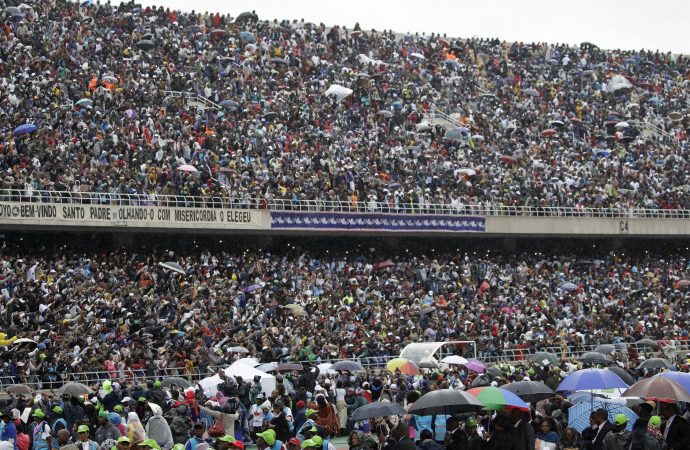-

-
In a country overcoming decades of conflict, Pope Francis on Friday 6 Sep, told some 40,000 people that they have the right to peace, but that they have to build their country on forgiveness and not “plotting opportunities for retaliation.”
Francis also noted that Mozambique is a land of abundant natural and cultural riches, yet great numbers of its people live below the poverty line. In addition, he said, it seems that the price being paid for foreign aid is the “corruption” of those who receive it.
Speaking to the country’s Catholics, the pope said that they’re called to follow Jesus in “the path that led him to love those who betrayed him, who judged him unjustly, who killed him.”
In proposing this path of forgiveness, Francis said, Jesus wants to “end forever that common practice of being Christians yet living under the law of retaliation.”
Pope Francis’s words came during his homily as he celebrated Mass in the Zimpeto Stadium, on the outskirts of Maputo. This was the pontiff’s first and only Mass in this nation of 29 million people, a majority of whom are Christians.
When he arrived in the stadium, Francis toured the premises in the popemobile, waving to the cheering crowd. Despite the uncommonly low temperatures, people began arriving to the stadium at 4am. Though most of those in attendance were from Maputo, some came from neighboring cities and even countries, such as a group from the kingdom of Swaziland, who traveled all night to attend the Mass.
But not everyone who wanted to take part in the Mass was able to make the trip towards the capital, particularly among those who live in rural areas, which is an estimated 70 percent of the population. In addition, only 40 percent of the country has access to electricity, meaning that viewing the Mass on TV wasn’t a possibility for most either.
To make sure his community could participate, Argentine missionary priest Juan Gabriel Arias set up a projector with the help of a solar panel and a white cloth. His church is some 120 miles from the capital, in Gaza. He could have had first-row seats at the stadium, but as he told Pope Francis when he was in the Vatican in August, he wanted to stay with his people.
“No family, no group of neighbors, no ethnic group, much less a nation, has a future if the force that unites them, brings them together and resolves their differences is vengeance and hatred,” Francis said. “We cannot come to terms and unite for the sake of revenge, or treating others with the same violence with which they treated us, or plotting opportunities for retaliation under apparently legal auspices.”
Weapons, he said, are never a solution to violence, instead creating new and more serious conflict. An “equity” that is rooted in violence will always be a “spiral with no escape,” and the cost too high.
“Yet another path is possible, for it is crucial not to forget that our peoples have a right to peace,” Francis said. “You have a right to peace.”
When Jesus commanded his disciples and those who follow him to “love their enemies,” Francis said, he wasn’t being “abstract,” nor an “idealist, someone who ignores reality.”
“He is talking about specific enemies, real enemies,” the pope said. “Those who hate us, exclude us, revile us and defame us.”
Many of those present in the Zimpeto Stadium can tell their own stories of violence, concerning things that happened to them personally, to people they know and are no longer alive.
From 1977 to 1992, Mozambique fought a civil war. Over a million people were killed during the conflict, and four million displaced. The civil war ended with a peace deal negotiated with the Rome-based Sant’Egidio Catholic lay movement. The conflict reignited on a smaller scale in 2013, and a final peace agreement was signed just over a month ago, on Aug. 1.
During his visit, Francis has been trying to reinforce the country’s fragile peace; however, many locals fear that next month’s elections could lead to another spark in violence.
Without going to the causes behind the conflict, Francis acknowledged that it’s not easy to speak of reconciliation while wounds are still open after years of violence. Nor is it easy to move towards forgiveness, “which is not the same as ignoring pain or giving up our memories or ideals.”
“Even so, Jesus Christ is calling us to love and to do good,” Francis said. “This means much more than simply ignoring the persons who harmed us, or trying to avoid encountering them. Jesus commands us to show an active, impartial and extraordinary benevolence towards those who have hurt us.”
Society cannot look into the future, he argued, nor build a nation, “on the basis of violence.” One cannot follow Jesus and apply “an eye for an eye.”
To make his commandment applicable, Francis said, Jesus left a “Golden Rule,” that is within reach of everyone: “Do to others as you would have them do to you,” as the Son of God posed in the Gospel of Luke.
Yet the world has failed to follow this Golden Rule, Francis said, choosing instead to ignore the virtue of mercy, killing and abandoning the handicapped and the elderly, eliminating the wounded and infirm, and being more concerned with the suffering of animals.
The world, he summarized, “has not practiced the goodness and kindness that lead us to consider the needs of our beloved neighbor as our own.”
After the Mass, Pope Francis was scheduled to head to the airport, to begin a Sept. 6-10 visit to Madagascar. His three-nation tour will end with a short visit to Mauritius on Sept. 9.
Source: Crux





